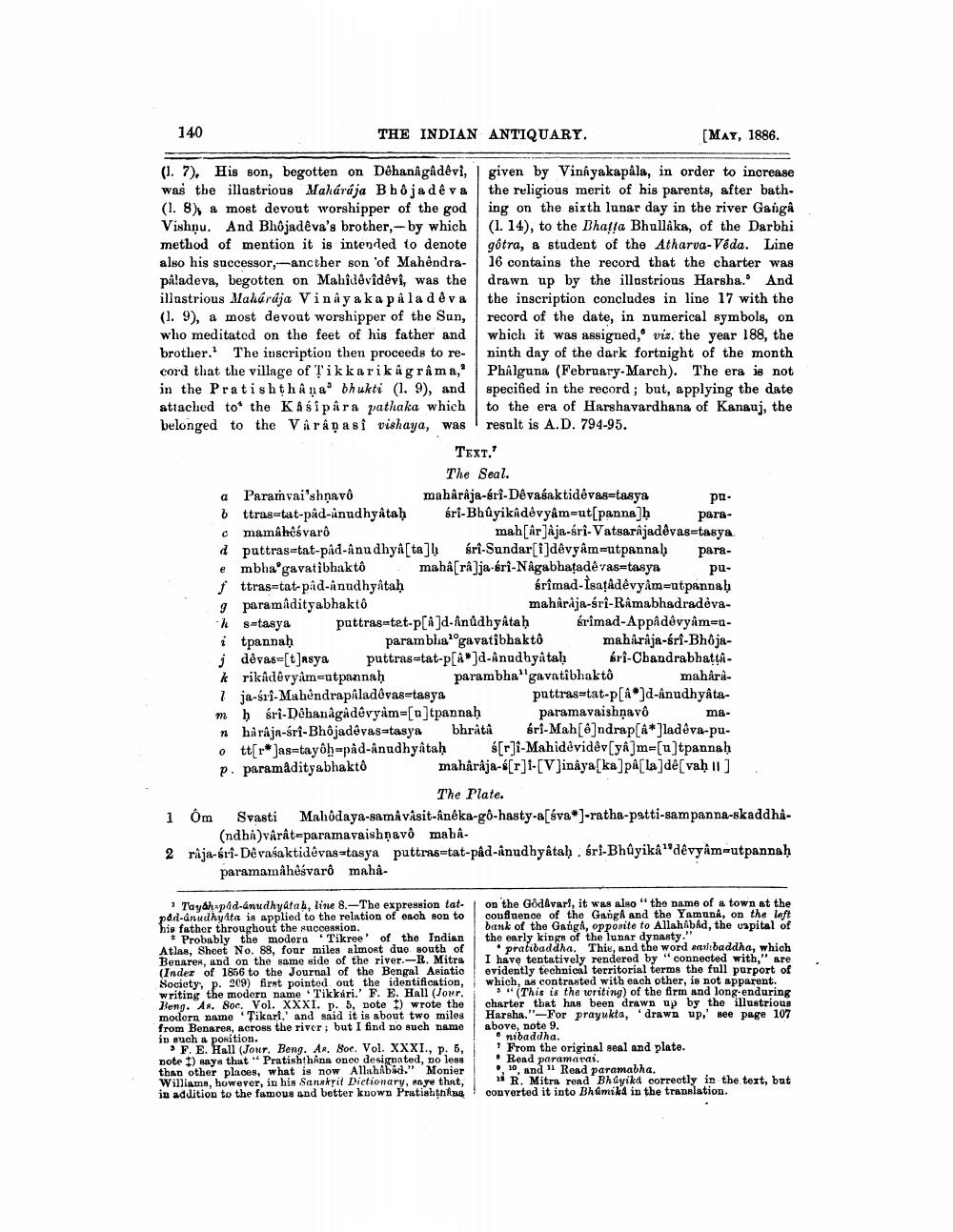________________
140
THE INDIAN ANTIQUARY.
(MAY, 1886.
(1. 7). His son, begotten on Dehankgadēvi, given by Vinayakapala, in order to increase was the illustrious Mahárája Bhojadeva the religious merit of his parents, after bath. (1. 8), a most devout worshipper of the god ing on the sixth lunar day in the river Ganga Vishņu. And Bhöjadêva's brother, - by which (1. 14), to the Bhatta Bhullâka, of the Darbhi method of mention it is intended to denote gótra, a student of the Atharva-Véda. Line also his successor,-ancther son of Mahendra- 16 contains the record that the charter was paladeva, begotten on Mahîdêvîdêvî, was the drawn up by the illastrious Harsha. And illustrious Maharaja Vinaya ka pala d évathe inscription concludes in line 17 with the (1. 9), a most devout worshipper of the Sun, record of the date, in numerical symbols, on who meditated on the feet of his father and which it was assigned, vix, the year 188, the brother. The inscription then proceeds to re- ninth day of the dark fortnight of the month cord that the village of Tikkarikågrâma, Phålguna (February March). The era is not in the Pratishth &ņa bhukti (1. 9), and specified in the record; but, applying the date attached to the Kasi para pathaka which to the era of Harshavardhana of Kanauj, the belonged to the Var åpasi vishaya, was result is A.D. 794-95.
Твхт.?
The Seal. a Paramvai'shņavo mahârâja-sri-Dêvasaktidévas-tasya pa. bttras-tat-pad-inudhyâtah sri-BhůyikAdévyam-ut(panna]h parac mamáheśvarð
mah[ar]āja-sri-Vatsarajadêvastasya d puttras-tat-pâd-anu dhyâ[ta]h śrî-Sundar[i]dêvyám=utpannah parae mbhagavatibhaktô mahå[ra]ja-érî-Någabhatade vastasya pufttras-tat-pad-Anudhyâtaḥ
érîmad- Isațâdêvyâm=utpannah 9 paramadityabhaktô
mahârâja-sri-Ramabhadradeva. sætasya puttras-tet-PCA]d-Anûdhyâtah r imad-Appadevyam-ai tpannaḥ
parambhagavatîbhaktô maharaja-sri-Bhojaį dévas=[t]asya puttras-tat-p[A]d-Anudhya tah bri-Chandrabhattk rikâdevyám=utpannah
parambha 'gavatibhaktô m ahara1 ja-sri-Mahồndrapiladovas-tasya
puttras-tat-p[A]d-Anudhyâtam sri-Dehanâgådévyam-[n]tpannaḥ paramavaishnavô ma
n ha rájn-sri-Bhojadevas-tasya b hrata sri-Mah[@]ndrap[4*]ladóva-puott[r* Jas=tayôh=påd-anudhyâtah [r]i-Mahidevidêr [yâ]m-[u]tpannah p. paramadityabhaktô mahârâja-[r]-[V]inaya[ka]på[la]de[ vaḥ 11 )
The Plate. 1 Om Svasti Mahôdaya-sama vasit-aneka-go-hasty-a[éva*)-ratha-patti-sampanna-skaddha
(ndhi)varât=paramavaishnavê maha 2 raja-bri-Dévasaktidévastasya puttras-tat-pad-Anudhyâtah. sri-Bhủyika"dévyam-utpannah
paramamaheśvarô maha
* Tayah padanudhyatah, line 8.-The expression tat. pod-dnudhuita is applied to the relation of onch son to his father throughout the succession.
Probably the modera Tikree of the Indian Atlas, Shoet No. 88, four miles almort duo south of Benares, and on the same side of the river.-R. Mitra (Index of 1856 to the Journal of the Bengal Asiatio Society, p. 209) first pointed out the identification, writing the modern name Tikkári. F. E. Hall (Jour. Beng. As. Soc. Vol. XXXI. p. 5, note 1) wrote the modern name "Tikari,' and said it is about two miles from Benares, across the river: but I find no such time in such a position.
F. E. Hall (Jour. Beng. Ar. Soc. Vol. XXXI., P. 5, note 1) says that "Pratishthina once designated, no less than other places, what is now Allahabad." "Monier Williams, however, in his Sanskrit Dictionary, enye that, in addition to the famous and better known Pratishthin
on the Godavari, it was also the name of a town at the confluence of the GangA and the Yamuna, on the left bank of the Gang, opposite to Allahabad, the uspital of the early kings of the lunar dynasty."
pratibaddha. This, and the word sabaddha, which I have tentatively rendered by "connected with," are evidently technical territorial terms the full purport of which, as contrasted with each other, is not apparent.
5" (This is the writing) of the firm and long enduring charter that has been drawn up by the illustrious Harsha."-For prayukta, drawn up, see page 107 above, note 9. o nibaddha.
From the original seal and plate. . Read paramarai.
10 and 11 Read paramabha.
11 R. Mitra read Bhúyikd correctly in the text, but ! converted it into Bhamika in the translation.




